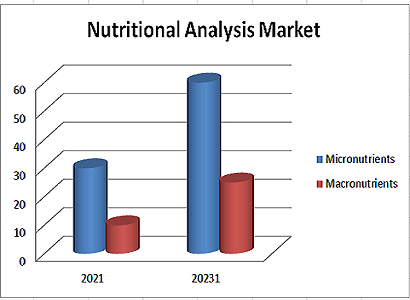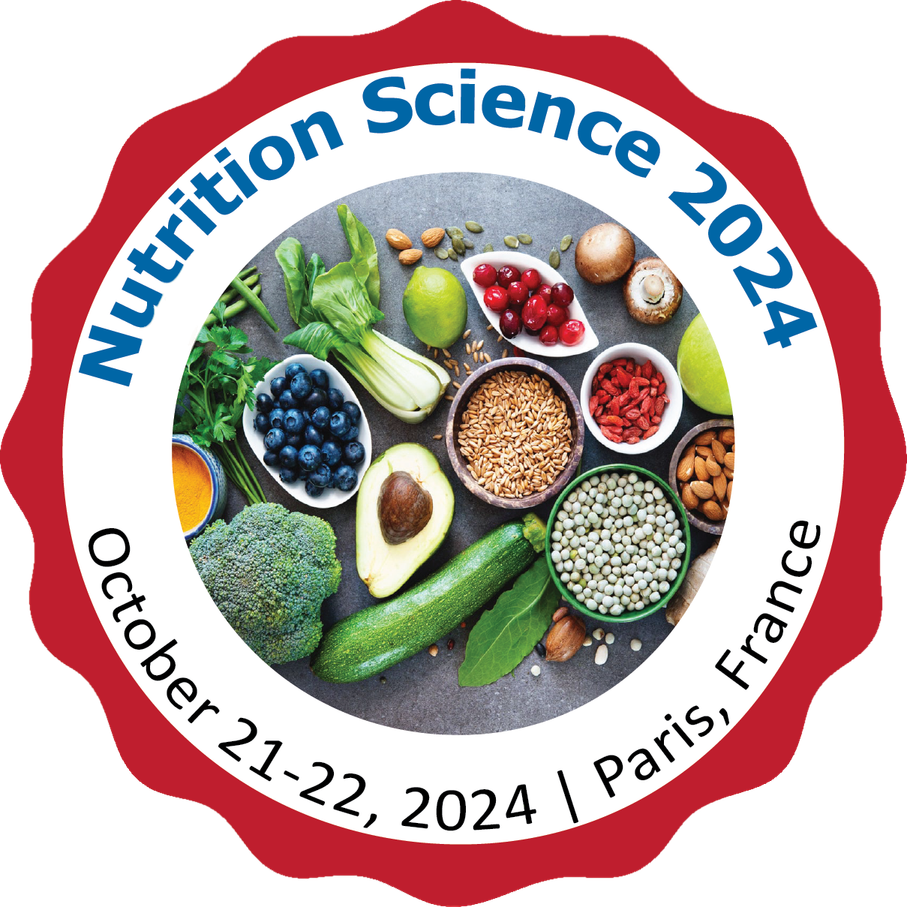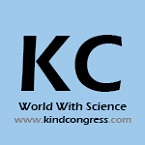Previous Speakers

Ms.Niloofar Pejman
Polytechnic University of Catalonia, Barcelona, Spain
Recommended Global Nutrition Webinars & Conferences
Europe & UK
Asia Pacific & Middle East
Canada
Nutrition Science 2024
- About the Conference
- Nutrition
- Food Science
- Sessions & Tracks
- why to attend our conference?
- Market Analysis
- Past Conference Report
About the Conference
We are currently bringing the "28th World Congress on Nutrition and Food Sciences" (NUTRITION SCIENCE 2024) dated on October 21-22, 2024 at Paris, France. The conference invites all the participants across the globe to attend and share their insights and convey in the field of Food and Nutritional Sciences.
Conference Theme "Addressing global challenges in nutrition and food security"
The Nutrition Science 2024 is honored to host high-profile keynote speakers from around the world such as speakers(oral presentations), poster presentations, young re-searchers forum, delegates to discuss and share on Food and Nutritional Sciences.
Nutrition
Nutrition is the science and study of the interactions between living organisms and the substances they consume to obtain and maintain health. It involves the processes of ingestion, digestion, absorption, transport, assimilation and excretion of nutrients found in food. The goal of nutrition is to understand how different nutrients impact the body's functions, growth, development and maintenance.
Carbohydrates:- Main sources of energy, found in foods like grains, fruits and vegetables.
Proteins:- Essential for building and repairing tissues, found in meat, beans, dairy and nuts.
Fats:- Important for energy storage, insulation and nutrient absorption, found in oils, nuts and fatty fish.
Vitamins:- Essential for various biochemical processes. Examples include vitamin C, found in fruits and vitamin D, obtained from sunlight and certain foods.
Minerals:- Important for bone health, nerve function and more. Examples include calcium (dairy) and iron (meat and legumes).
Water:- Vital for digestion, nutrient transport, temperature regulation and waste elimination.
Dietary Fiber:- Found in fruits, vegetables and whole grains, it aids in digestion and helps prevent constipation
Food Science
Food science is a multidisciplinary field that involves the study of the physical, chemical, biological, and engineering properties of food and the application of this knowledge to the production, processing, preservation, quality assurance and distribution of food products. It combines principles from various scientific disciplines such as biology, chemistry, physics, microbiology and engineering to understand the nature of food and improve its safety, quality and nutritional value.
Food Chemistry:- Examines the composition and properties of food components, including carbohydrates, proteins, fats, vitamins, minerals and additives.
Food Microbiology:- Focuses on the study of microorganisms in food, including their role in food spoilage, preservation and foodborne illnesses.
Food Engineering:- Involves the application of engineering principles to food processing, packaging, and storage to optimize efficiency, safety and quality
Sessions & Tracks
Nutritional Epidemiology: Discussions on the relationship between diet and health outcomes, including the latest research on the impact of various nutrients and dietary patterns on disease risk.
In nutritional epidemiology, researchers typically collect data on dietary intake through various methods such as food frequency questionnaires, dietary recalls or dietary records. They then analyze this data alongside information on health outcomes, such as the incidence of chronic diseases like obesity, diabetes, cardiovascular disease, cancer and other health-related conditions.
Clinical Nutrition: Presentations on the role of nutrition in the prevention and treatment of various medical conditions, such as obesity, diabetes, cardiovascular disease and gastrointestinal disorders
Clinical nutritionists use MNT to manage and treat medical conditions through individualized dietary plans. This involves assessing a patient's nutritional status, health history and specific needs, and then developing a personalized nutrition plan to address their condition and It also conducts the comprehensive assessments to evaluate a patient's nutritional status, which may include analyzing dietary intake, conducting physical examinations, and assessing biochemical markers.
Nutritional Science: Nutritional science explores the various types of nutrients essential for the body, including macronutrients (carbohydrates, proteins, fats) and micronutrients (vitamins and minerals). Understanding the roles and functions of these nutrients is crucial in maintaining optimal health.
Digestion and Metabolism:The field examines the processes of digestion, absorption, and metabolism, which convert ingested food into energy and building blocks for cellular function.
Dietary Patterns: Researchers in nutritional science investigate the impact of different dietary patterns on health. This includes studies on the effects of specific diets, such as the Mediterranean diet or vegetarianism, on various health outcomes.
Disease Prevention and Treatment: Nutritional scientists study the relationship between diet and the prevention or management of various diseases, including cardiovascular diseases, diabetes, obesity, and certain cancers. They explore how specific nutrients and dietary patterns can contribute to health or increase disease risk.
Public Health Nutrition: This aspect of nutritional science focuses on population-level nutrition, addressing issues such as food security, malnutrition, and the development of public health interventions to improve overall nutritional status.
Sports Nutrition: Researchers study how nutrition influences athletic performance, recovery, and overall well-being. This includes optimizing nutrient intake for endurance, strength, and other athletic goals.
Nutritional Assessment: Nutritional scientists develop and use methods to assess an individual's nutritional status. This may include dietary surveys, anthropometric measurements, and biochemical tests.
Food Technology and Fortification: Nutritional science explores ways to enhance the nutritional content of food through fortification and the development of functional foods to address specific health needs.
Public Education and Policy: Nutritional scientists contribute to public education and policy initiatives, translating research findings into dietary guidelines and recommendations. They play a role in shaping public understanding of nutrition and influencing policies related to food and nutrition
Dietitian: A Dietitian also known as a registered dietitian (RD) or a registered dietitian nutritionist (RDN) in some regions, is a trained and qualified healthcare professional specializing in the field of nutrition. These professionals work with individuals, communities, and organizations to provide expert advice on nutrition and promote healthy eating habits. Here's a brief overview of the role and responsibilities of dietitians
Education and Training: Dietitians typically hold a bachelor's degree in dietetics, nutrition, or a related field. Many dietitians also pursue advanced degrees or certifications.
In many countries becoming a registered dietitian involves completing a supervised internship or practical training program and passing a national examination.
Clinical Nutrition: Dietitians may work in clinical settings, such as hospitals or healthcare facilities, where they assess and manage the nutritional needs of patients with medical conditions or those undergoing medical treatments.
Community Nutrition: Some dietitians focus on community nutrition, working in public health or community organizations. They develop and implement nutrition programs, conduct educational workshops and address public health issues related to diet and nutrition.
Food Service Management: Dietitians in food service management roles are involved in planning and managing food service operations in institutions such as hospitals, schools, and long-term care facilities. They ensure that meals meet nutritional standards and cater to the specific needs of the population.
Nutraceuticals: Nutraceuticals often include functional foods, which are foods with added bioactive compounds that offer health benefits beyond basic nutrition. Examples include fortified cereals, probiotic yogurt and omega-3 enriched eggs.
Dietary Supplements: Nutraceuticals also encompass dietary supplements, such as vitamins, minerals, herbal extracts, amino acids, and other bioactive compounds, taken in concentrated forms to support health.
Health Benefits: Nutraceuticals are believed to provide a range of health benefits, including antioxidant properties, anti-inflammatory effects, immune system support, cardiovascular health, and cognitive function improvement.
Bioactive Compounds: The active ingredients in nutraceuticals are often bioactive compounds, such as polyphenols, flavonoids, phytochemicals, and other naturally occurring substances in plants. These compounds are thought to have positive effects on health.
Nutritional Biochemistry and Metabolism: Nutritional biochemistry examines the chemical composition and properties of macronutrients (carbohydrates, proteins, and fats) and micronutrients (vitamins and minerals). It investigates how these nutrients are digested, absorbed and utilized by the body.
Presentations on the biochemical processes involved in nutrient digestion, absorption, metabolism and their impact on health and disease.
Nutrigenomics: Nutritional science has expanded to include nutrigenomics, which examines how individual genetic variations influence responses to diet and how personalized nutrition recommendations can be tailored based on genetic information.
Nutrigenomics examines how genetic variations (such as single nucleotide polymorphisms, or SNPs) influence an individual's response to dietary components. These genetic variations can affect nutrient metabolism, absorption, utilization, and susceptibility to diet-related diseases.
why to attend our conference?
Attending a NUTRITION SCIENCE 2024 can offer numerous benefits for professionals, researchers and individuals interested in the field of nutrition. Here are several reasons why you might consider attending a nutritional conference
This conference aim is to provide latest research on Food and Nutrition and to get rid of bad diet from everyone and to share the knowledge on healthy diet, obesity and weight management and also sharing of some food security challenges during pandemic situation.
The NUTRITION SCIENCE 2024 includes advanced workshops on Food and Nutrition, lectures and symposia including a designated registration area, a refreshment break and gala lunch. So come and join leading experts and allied professionals to keep up with the rapidly accelerating pace of change that is already having an impact on the field of Food & Nutrition and will continue to in the future.
Market Analysis
The international nutritional analysis market is predictable to be USD 5.4 billion in 2021 and is anticipated to grasp USD 7.9 billion by 2026 at a CAGR of 8.3% from 2021 to 2031.
Market of food and Nutrition supplements market has seen a prodigious spike in manufacture and sales. This has empowered many new Industries to dive into the business sector with goods that pledge to be the remedy for youth, wellbeing and essentialness. As directed by the Nutritional journals the nutritional supplement market worldwide is estimated to be $104 billion.

Nutrition analysis is the progression of concentrating food while also allowing for biosynthesis, catabolism, excretion, assimilation, and absorption. Nutritional analysis guarantees that food quality is enhanced and secure. Nutritional analysis is most usually used in the retail food packaging industry in the form of nutrition fact menus and panel labeling. The nutritional makeup of foods can be discovered and measured precisely through nutritional analysis. This is significant because the nutritional composition of food is enormously essential to both consumers and authorities.
Past Conference Report
Nutrition Science 2023
27th World Congress on Nutrition and Food Sciences was held during October 16-17, 2023 at Singapore City, Singapore. With the support and contribution of the Organizing Committee Members were successfully hosted the event at the conference venue. Firstly we must thank you for trusting us and participating at Nutrition Science 2023 is a global platform to discuss various important details about Nutrition and Food Sciences
There are many reasons to extend our gratitude to you for making the Nutrition Science 2023 outstanding conference. We couldn't have done it without your continuous support and believe towards our organization which mutually made to achieve a new heights in the field of Nutrition and Food Sciences. The conference was marked with the attendance of Vitamins, Minerals, Dietary Fiber, Protein, Carbohydrates, Re-searchers, Scientists and talented student communities representing more than 30 countries who have driven this event into the path of success. The conference was organized around the theme “Bridging Excellence in Food and Nutrition”. The event implanted a firm relation of upcoming strategies in the business related field with the scientific community.
The conference proceedings were carried out through various Scientific-sessions and plenary lectures of which the following Speakers were highlighted as: The conference witnessed an amalgamation of peerless speakers, Keynote speakers, well-known International speakers and delegates who enlightened the crowd with their enviable research knowledge and on various alluring topics related to the field of Minerals, Proteins Carbohydrates, Healthy Fats, Diet Planning, Food Groups, Balanced Diet, Amino Acids. Through their fabulous presentations at the podium of Cosmetic Derma Summit. We offer its heartfelt appreciation to all the Organizing Committee Members, Chairs and Co-chairs, Speakers, Students and Editorial Board Members who supported the conference in every aspect for the awe-inspiring exhibition at the venue. We are also obliged to various delegate experts, company representatives and other eminent personalities who supported the conference by facilitating active discussion forums. We sincerely thank the Organizing Committee Members.
So, as continuation of Nutrition Science 2024 we would like to heartily invite you to 28th World Congress on Nutrition and Food Sciences in the dated of October 21-22, 2024 at Paris, France. We look forward to see your presence with active contribution and support to make this event successful once more.
Contact for more details
Program Manager | Nutrition Science 2024
Past Reports Gallery
To Collaborate Scientific Professionals around the World
Conference Date October 21-22, 2024
For Sponsors & Exhibitors
Speaker Opportunity
Useful Links
Past Conference Report
Supported By
All accepted abstracts will be published in respective Conference Series International Journals.
Abstracts will be provided with Digital Object Identifier by









